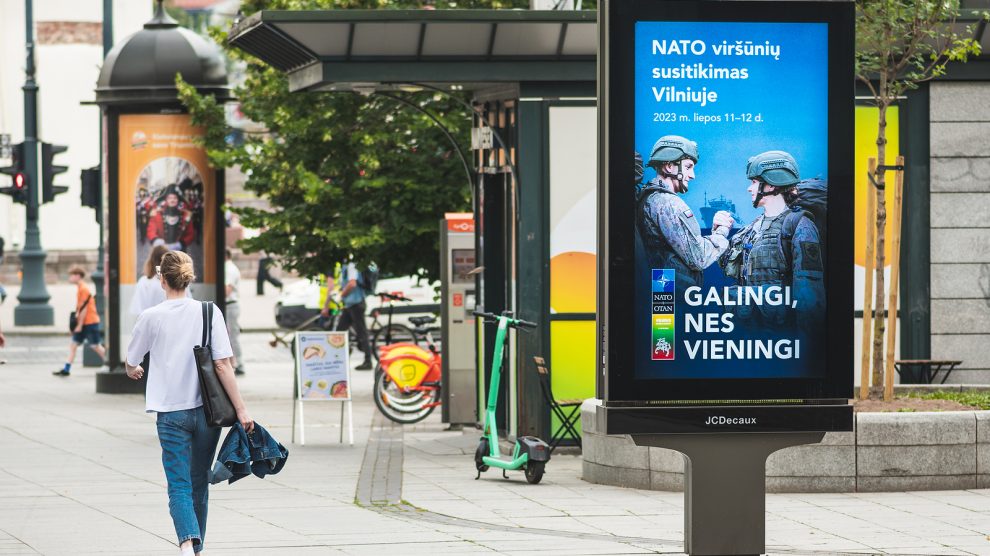Ukraine will in Vilnius once again be looking for a clear pathway towards NATO membership. It will certainly want more than vague assurances of eventual membership, which have proven to be no deterrence against Russia’s aggression.
There has not been a NATO summit as crucial as this week’s gathering in Vilnius since the alliance’s leaders met in Bucharest in 2008.
There, Ukraine and Georgia had been hoping to given a NATO membership action plan – a formal roadmap to full membership. Instead, in the presence of Russian President Vladimir Putin, an invitee to the summit, they were given vague assurances that they would become NATO members “at some stage in the future”.
- NATO must recognise that the countries of the Eastern Flank are not the problem, they are the solution
- An alternative to Russia and China: Turkey’s role in the South Caucasus and Central Asia
- Why Georgia should follow the Baltic blueprint
Just months later, Russia invaded Georgia. It continues to occupy a fifth of Georgian territory. In the years since, Russia has gone further, annexing Ukraine’s Crimean Peninsula and parts of the Donbas region in 2014. In February 2022 it launched a full-scale invasion of Ukraine.
As it continues to fight the war provoked that invasion, Ukraine will in Vilnius once again be looking for a clear pathway towards NATO membership. It will certainly want more than vague assurances of eventual membership, which have proven to be no deterrence against Russia’s aggression.
It is likely to once again be disappointed. On July 9, before leaving for Europe, US President Joe Biden made it clear that he believes “Ukraine is not yet ready to enter NATO”.
“I don’t think there is unanimity in NATO about whether or not to bring Ukraine into the NATO family now, at this moment, in the middle of a war,” Biden said in an interview with CNN’s Fareed Zakaria. “If the war is going on, then we’re all at war. We’re at war with Russia.”
While Biden did concede that the alliance needed to lay out a “rational path” for Ukraine’s membership, his comments are both disingenuous and cynical.
Ukraine itself fully accepts that it cannot join NATO until its war against Russia’s invasion is won. President Volodymyr Zelensky, on a tour of several NATO members last week, hinted that what he was looking for in Vilnius was instead, “a clear signal that Ukraine will be in the alliance. Not that the door is open for us, which is not enough, but that Ukraine will be in it”.
He received hitherto unlikely support at the weekend from Turkish President Recep Tayyip Erdogan, who said after a meeting with Zelensky in Istanbul that, “there is no doubt Ukraine deserves to be in NATO”.
The head of NATO, Jens Stoltenberg, whose tenure at the helm of the alliance was recently extended for a further year – thereby avoiding a row in Vilnius over choosing his successor – said on July 10 that he is “absolutely” confident that allies will agree on a form of wording about Ukraine’s future accession to the alliance that will be acceptable to Kyiv.
“I am not saying it is always easy and straight forward because when we are many allies of course there are different positions, different views, but that is nothing new… but the strength of NATO, which we are proving again and again, is that we are always able to unite around a common task, a common message,” he told Sky News.
Nevertheless, the best Kyiv appears able to hope for is the promise of a yet undefined “shorter route” to membership, probably bypassing the membership action plan accession formalities which could speed up the process of joining.
This shorter route, however, will only come into play as and when a formal offer of membership is made.
Ukraine is also expected to be offered a package of “enabling security guarantees” at the summit – an assurance that military aid and training from NATO members will continue for as long as they are needed.

Georgian indifference
Georgia, while it continues to publicly assert its desire for membership, currently appears less keen in practice. That its delegation to Vilnius will be led by Foreign Minister Ilia Darchiashvili and not by the country’s prime minister, Irakli Garibashvili, is a clear sign of its current indifference.
At a recent security conference in Bratislava, Garibashvili went so far as to claim that NATO was at fault for the war in Ukraine. This provoked an angry reaction in Kyiv. Ukrainian Deputy Prime Minister for European and Euro-Atlantic Integration, Olha Stefanishina, said that she felt “very sorry” for Georgia, “which is now in a situation where top government officials can make such statements. We are with the Georgian people”.
Last week, Zelensky expelled Georgia’s ambassador to Kyiv following the publication of new photographs revealing the emaciated state of a former Georgian president, Mikheil Saakashvili, who is serving a prison sentence in Georgia following his conviction for “abuse of power” – charges he has always claimed were politically motivated.
Saakashvili, who was stripped of his Georgian passport after becoming a Ukrainian citizen in 2015, “must not be allowed to die behind bars”, said Zelensky.
Unlike many news and information platforms, Emerging Europe is free to read, and always will be. There is no paywall here. We are independent, not affiliated with nor representing any political party or business organisation. We want the very best for emerging Europe, nothing more, nothing less. Your support will help us continue to spread the word about this amazing region.
You can contribute here. Thank you.







Add Comment